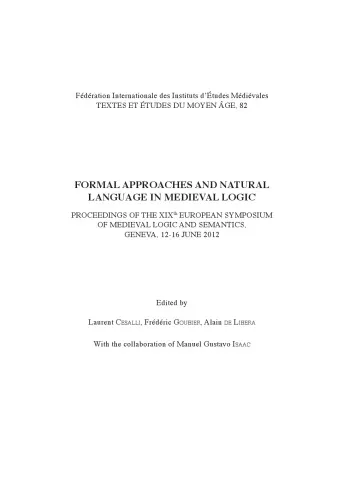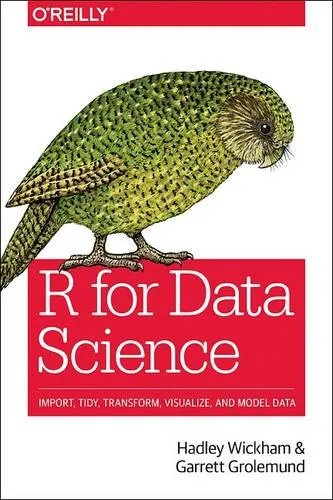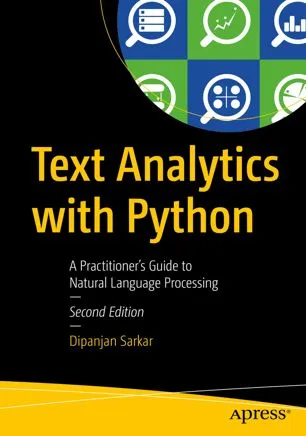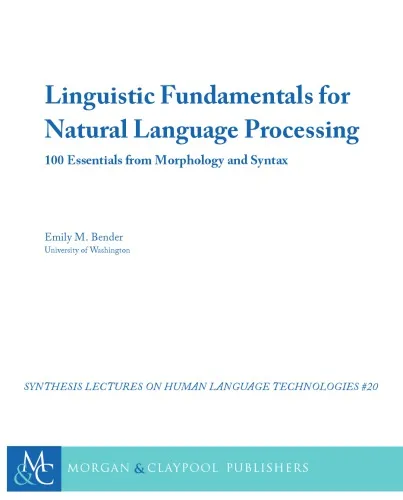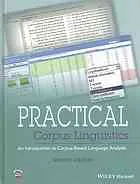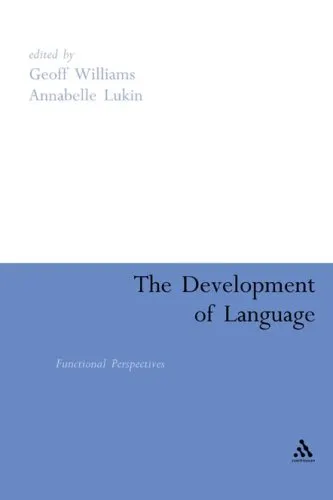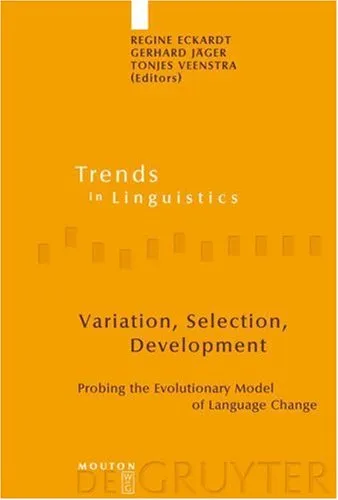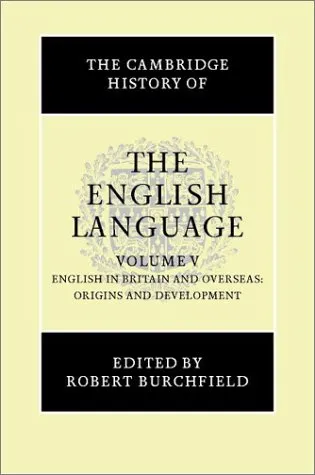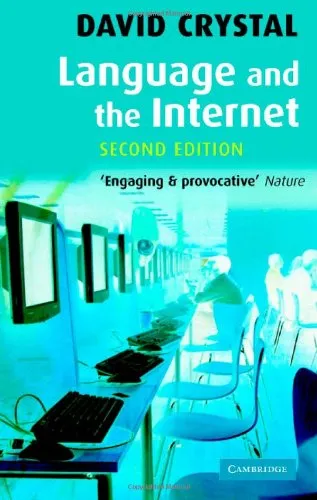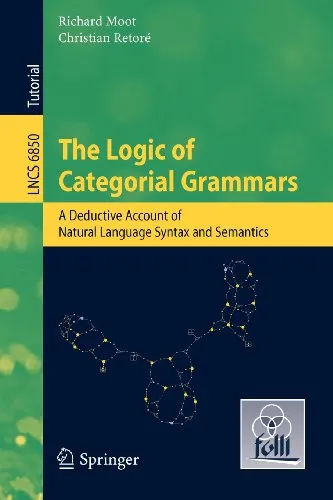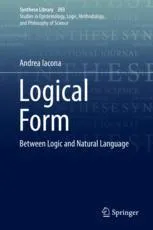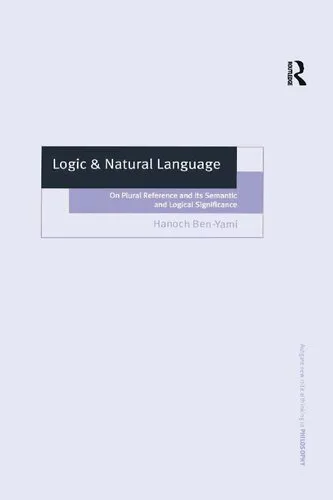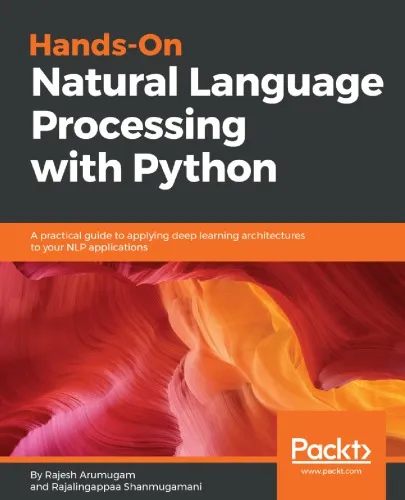Formal Approaches and Natural Language in Medieval Logic: Proceedings of the XIXth European Symposium of Medieval Logic and Semantics, Geneva, 12-16 June 2012
3.7
بر اساس نظر کاربران

شما میتونید سوالاتتون در باره کتاب رو از هوش مصنوعیش بعد از ورود بپرسید
هر دانلود یا پرسش از هوش مصنوعی 2 امتیاز لازم دارد، برای بدست آوردن امتیاز رایگان، به صفحه ی راهنمای امتیازات سر بزنید و یک سری کار ارزشمند انجام بدینکتاب های مرتبط:
کتاب Formal Approaches and Natural Language in Medieval Logic
کتاب Formal Approaches and Natural Language in Medieval Logic: Proceedings of the XIXth European Symposium of Medieval Logic and Semantics، Geneva، 12-16 June 2012 مجموعهای از مقالات ارائهشده در نوزدهمین سمپوزیوم اروپایی منطق و سمانتیک قرون وسطی است. این اثر به دقت علمی بالایی تنظیم شده و مبانی منطق صوری و نحوه پیوند زبان طبیعی با منطق قرون وسطی را بررسی میکند. هدف اصلی این کتاب ارائه بینشی جامع و بدیع درباره نقشی است که منطق صوری و تحلیل زبان طبیعی در تفکر فلسفی و زبانی دانشمندان قرون وسطایی داشتهاند.
خلاصهای از کتاب
این کتاب شامل بخشهای مختلفی است که هرکدام به یکی از جنبههای منطق و زبان طبیعی قرون وسطی میپردازند. مقالات ارائهشده در این سمپوزیوم توسط محققانی برجسته در زمینه منطق قرون وسطایی نوشته شدهاند. مباحث شامل تحلیل Formal Approaches و سمانتیک زبان طبیعی در آثار فیلسوفانی مانند توماس آکویناس، ویلیام اوکام و نظایر آنها میشود. نویسندگان در این کتاب نه تنها به تفکر کلاسیک نگاه میکنند، بلکه سعی دارند ارتباطهایی میان مبانی منطق قرون وسطی و منطق مدرن ایجاد کنند.
یکی از نکات کلیدی این کتاب بررسی تعامل میان ساختارهای منطقی و زبان طبیعی است. در قرون وسطی، منطق بیشتر به عنوان ابزاری برای تحلیل زبان بهکار میرفت و در این کتاب نویسندگان تلاش کردهاند این نقش را تحلیل و بسط دهند. علاوه بر این، کاربرد مبانی منطق در مباحث دینی نیز بخشی دیگر از تمرکز کتاب است.
نکات کلیدی برجسته
- ارتباط میان Formal Logic و تحلیل زبان طبیعی در فلسفه و سمانتیک قرون وسطی.
- درسهای بنیادین از آثار فیلسوفان بزرگی چون توماس آکویناس و ویلیام اوکام.
- رویکرد مقایسهای بین مبانی منطق در گذشته و کاربردهای مدرن آن.
- تمرکز بر سمانتیک و تحلیل دستوری زبان طبیعی بر اساس متون قرون وسطایی.
- کاربرد اصول منطق در مباحث دینی و تطبیق آنها با تفکر فلسفی.
جملات معروف از کتاب
“The interplay between natural language and Formal Logic not only shapes the medieval intellectual world but also provides tools for contemporary philosophical inquiries.”
“Understanding medieval thought requires bridging the gap between technical Logic and the ordinary linguistic practices of the time.”
“Semantics in medieval Logic is not just about words; it's about worlds.”
چرا این کتاب مهم است؟
اهمیت این کتاب در تأکید بر تعامل میان Formal Approach و زبان طبیعی در تاریخ منطق است. این اثر به ما یادآوری میکند که مطالعات قرون وسطی تنها محدود به گذشته نیستند، بلکه تاثیر شگرفی بر مفاهیم مدرن در فلسفه و منطق دارند. محققان حوزههای فلسفه زبان، منطق و حتی ادبیات میتوانند از رویکردهای ارائهشده در این کتاب بهره ببرند.
علاوه بر این، این کتاب پلی میان مباحث آکادمیک و فرآیندهای زبانی در تفکر انسان ایجاد میکند و نشان میدهد که چگونه ابزارهای منطقی میتوانند به تحلیل مباحث زبانی کمک کنند. بهخصوص برای کسانی که به فلسفه تطبیقی و تاریخ منطق علاقه دارند، این کتاب مجموعهای ارزشمند از دانش و تحلیل عمیق را فراهم میآورد.
Introduction to "Formal Approaches and Natural Language in Medieval Logic"
"Formal Approaches and Natural Language in Medieval Logic" is a comprehensive exploration of the interplay between formal methodologies and natural language analysis in the context of medieval logic. This book presents the proceedings of the XIXth European Symposium of Medieval Logic and Semantics, held in Geneva from June 12 to June 16, 2012. As a platform where scholars and researchers converge, it delves into how logic in the Middle Ages reconciled rigorous formal systems with the complexities of natural language.
The historical development of medieval logic is a fascinating topic, serving as the cornerstone for modern logical theories. This book provides readers with a multifaceted perspective on these developments, presenting a synergy between traditional semantic frameworks and innovative modern interpretations. Not only is it an essential addition to the field of medieval studies, but it also offers valuable insights into the philosophical and linguistic foundations of logical analysis.
Detailed Summary of the Book
The book is structured into several thematically interconnected sections, each addressing key aspects of medieval logic and natural language. The contributions in this volume involve specialists in medieval philosophy and logic, presenting papers that explore the relationship between formal logic systems and their linguistic underpinnings during the Middle Ages.
One of the primary themes of the book is the evolution of semantic theories and their grounding in natural language. The authors examine how medieval logicians integrated Aristotelian logic with their innovative approaches to propositions, predications, and syntactic structures. A significant portion of the work is dedicated to modal logic and its interpretation, particularly in relation to necessity, possibility, and contingency in natural language representation.
Another key discussion centers on the interplay between formal syntax and linguistic semantics. The way medieval scholars bridged the gap between abstract, formalized systems of thought and the unpredictability of natural human speech continues to inspire contemporary thinkers. This dialogue is explored through a variety of topics, including syllogistic reasoning, supposition theory, fallacies, and the distinction between spoken and written discourse during the period.
Additionally, the book discusses the transmission and transformation of logical ideas, highlighting how medieval logic has influenced subsequent intellectual traditions. The contributions collectively argue that the medieval period was not merely a precursor to modern logic but a field of study that deserves recognition for its independent contributions.
Key Takeaways
- Medieval logic played a significant role in shaping the foundations of modern formal logic.
- The interaction between formal logic systems and natural language in the Middle Ages was both intricate and groundbreaking.
- Understanding medieval logic requires a grasp of both philosophical traditions and linguistic analyses.
- The innovations of medieval logicians remain relevant in contemporary discussions of semantics, syntax, and logical frameworks.
Famous Quotes from the Book
Here are some memorable and thought-provoking quotes from the book:
"The syntax of natural language is not chaotic; it reflects the structure of thought itself."
"Medieval logicians saw the uncertainties of language as an opportunity rather than an obstacle."
"To understand logic, one must first understand the language in which logic is articulated."
Why This Book Matters
This book matters because it bridges the gap between the historical contributions of medieval logic and the contemporary study of formal semantics and linguistics. It sheds light on the intellectual achievements of a period often dismissed as a 'Dark Age,' demonstrating the sophistication and relevance of medieval scholarship for present-day philosophical and logical inquiries.
The proceedings provide valuable resources for philosophers, linguists, historians, and theorists. They underscore the universality and timelessness of logical inquiry, proving that historic philosophical traditions continue to inspire innovation in modern thought. Whether you are a seasoned scholar or a curious learner, this book serves as both a guide and an inspiration for exploring the rich interplay between formal systems and the dynamics of natural language.
دانلود رایگان مستقیم
شما میتونید سوالاتتون در باره کتاب رو از هوش مصنوعیش بعد از ورود بپرسید
دسترسی به کتابها از طریق پلتفرمهای قانونی و کتابخانههای عمومی نه تنها از حقوق نویسندگان و ناشران حمایت میکند، بلکه به پایداری فرهنگ کتابخوانی نیز کمک میرساند. پیش از دانلود، لحظهای به بررسی این گزینهها فکر کنید.
این کتاب رو در پلتفرم های دیگه ببینید
WorldCat به شما کمک میکنه تا کتاب ها رو در کتابخانه های سراسر دنیا پیدا کنید
امتیازها، نظرات تخصصی و صحبت ها درباره کتاب را در Goodreads ببینید
کتابهای کمیاب یا دست دوم را در AbeBooks پیدا کنید و بخرید
1260
بازدید3.7
امتیاز0
نظر98%
رضایتنظرات:
3.7
بر اساس 0 نظر کاربران
Questions & Answers
Ask questions about this book or help others by answering
No questions yet. Be the first to ask!
